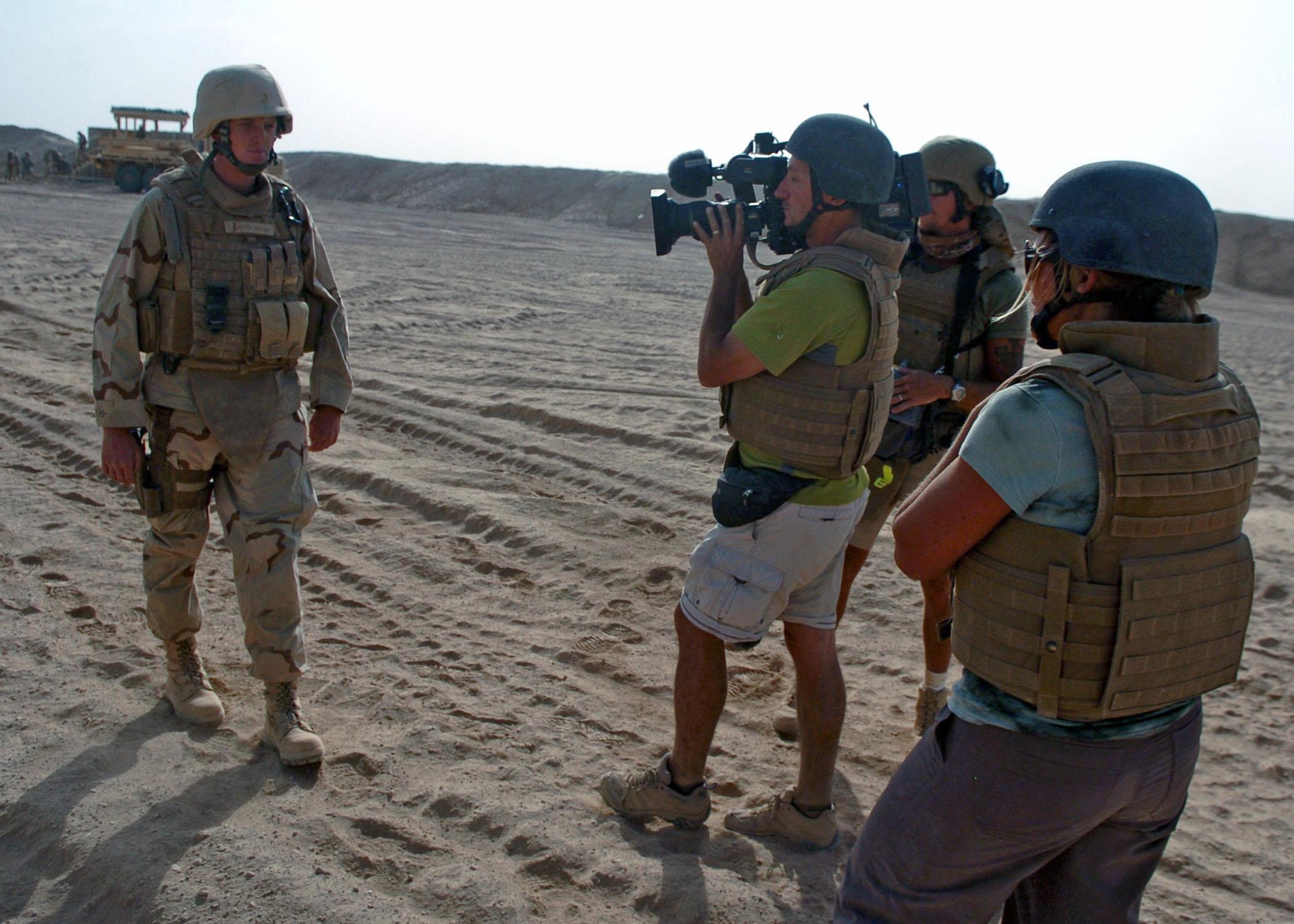Focusing on the “Fixers”: Toward a Transnational Media Ethics of War Reporting
archive

Focusing on the “Fixers”: Toward a Transnational Media Ethics of War Reporting
The recent deaths of journalists James Foley and Stephen Sotloff in Syria serve as a reminder that war reporters are increasingly becoming geopolitical targets. Since correspondents are so often cultural outsiders in the places on which they report, and since they distribute controversial representations of these places to transnational audiences, they risk being kidnapped, injured, or murdered. Yet, the war journalists whose images flood our screens are not the only subjects risking their lives to report on conflict. Though these figures powerfully capture the imaginations of various readers and viewers around the world, they are in fact supported by networks of local stringers, who are paid by foreign news outlets to “be on call and feed news regularly” (Bossone 2014, np), and “fixers,” who risk their own safety in order to set up interviews, drive the correspondents to certain locations, and act as translators along the way. Without these crucial collaborators, conflict journalism would not be possible.
Still, the important labor of supporting and guiding foreign journalists through the conflict zone is often erased from the final product; stringers and fixers rarely get the credit they deserve (Bossone 2014). I have spent the past two years conducting research on the cultural labor of conflict correspondents covering the “war on terror,” and I have viewed hundreds of hours of television news footage generated by these journalists. I can only identify one or two instances in which a contributing stringer or fixer has been mentioned in the report. There are a few potential reasons for this. In some cases, for example, the contributing stringers and fixers specifically ask the foreign correspondents not to mention their names, for fear of being labeled traitors by their own governments. One stringer that I interviewed said that when he was working in Pakistan, the Pakistani government would tolerate the US and British press, but would then arrest their Pakistani support staff after the foreign press returned home. On another level, though, fixers and stringers who do want to be credited have to contend with hierarchical definitions of what “journalism” actually is, where news editors vaguely assert the need for credited staff members to have “substantially contributed” to the report (cited in Bossone 2014).
...when fixers especially are represented as “the local hires,” they are subtly juxtaposed with the purportedly more cosmopolitan correspondents associated with “global” news brands.
One arena in which fixers and stringers do get more attention is in the English language industry trade discourse, many of which assert the vital contributions that these employees make. More and more, trade articles address the fact that these news employees are viewed as traitors by their governments, a crime that can result in imprisonment or death (McLeary 2007a, Blake 2008). The trade journals also sometimes give a nod to the fact that in particularly dangerous conflicts, western reporters cannot safely leave their compounds, and thus, they send their stringers and fixers out as “surrogates” (McLeary 2006, Ricchiardi 2006). Occasionally, the industry commentators writing these trade articles or the journalists they are interviewing might also assert that “the local hires are critical, because these are really the eyes and ears for the correspondents” (Gentile cited in McLeary 2007b).
While it is encouraging to see news industry commentators paying more attention to the news employees who support foreign journalists, there is still an insidious tendency to downplay the significance of this collaboration for transnational news reporting. When stringers and fixers are represented as “surrogates,” they are not respected on their own terms, but are instead cast as “doubles” for the “true” war correspondents whose work ostensibly cannot be replaced. Furthermore, when fixers especially are represented as “the local hires,” they are subtly juxtaposed with the purportedly more cosmopolitan correspondents associated with “global” news brands. Their language abilities, their knowledge of the culture, and their connections with potential interviewees—crucial skills that facilitate the foreign correspondents’ ability to write their stories—are cast as “particular” attributes of “local” assistants, rather than understood as key elements in the transnational process of reporting war.

This phenomenon can partially be explained by looking at the larger logic of globalization, which undeniably drives big brand news production. A number of scholars have shown that globalization attempts to empty out the particularities of place, creating one seamlessly interconnected space out of the world (Harvey 1989, Giddens 1991, Robertson 1992). Indeed, this image of a streamlined, interconnected world appears repeatedly on “global” newscasts, which adorn their programs with cartoonish graphics of a globe that is purportedly simple to traverse due to the wonders of satellite technology. As Esperança Bielsa and Susan Bassnett contend, this focus on instant communication, unhindered by the particularities of place, “makes translation processes in global communication invisible. . . .The nature of translation as a process which necessarily mediates between cultures is ignored” (2009, 23).
...western war reporting sometimes bolsters the totalizing logic of globalization, constructing and disseminating images of conflict that erase their own complex and inegalitarian conditions of production.
Following this assertion, big brand news organizations often obscure the significant cultural mediation upon which their transnational war coverage depends. Striving for the “seamless” and “total” coverage of the “war on terror” that media scholars such as James Der Derian and Roger Stahl have identified (2009, 2010), western news organizations often draw upon the essential mediation of stringers and especially fixers only to obscure that collaboration in the reports that are distributed around the world. In this sense, western war reporting sometimes bolsters the totalizing logic of globalization, constructing and disseminating images of conflict that erase their own complex and inegalitarian conditions of production.
Because of this problem, there is a need for a new strand of inquiry within the burgeoning field of global media ethics, one that sets its sights on the professional treatment of all news employees in the field. As Stephen Ward has suggested, a “global” media ethics should push past the concept of nation-state, recognizing that journalists are now speaking to and about wider and wider publics (2013). This usefully addresses the responsibilities that journalists have for the people on whom they report. Yet, I would also add that a new set of principles should be developed in relation to the transnational journalist’s risky labor. These principles would call for news executives and reporters alike to rethink the competitive production cultures that erase the complex translation and collaboration upon which war reporting depends. A transnationalist media ethics of war reporting would in turn demand that news organizations take more responsibility for the safety of their stringers and fixers, rather than pretending that these crucial media producers are, in fact, invisible.
Bielsa, Esperança and Bassnett, Susan. 2009. Translation in Global News. New York: Routledge.
Blake, Mariah. 2008. “Making it In (and Out) of Myanmar.”Columbia Journalism Review, May 16. http://www.cjr.org/the_water_cooler/making_it_in_and_out_of_myanma.php. Retrieved September 22, 2014.
Bossone, Andrew. 2014. “The Thankless Work of a ‘Fixer’.”Columbia Journalism Review, April 30. http://www.cjr.org/reports/the_thankless_work_of_a_fixer.php. Retrieved September 22, 2014.
Der Derian, James. 2009. Virtuous War: Mapping the Military Industrial Media Entertainment Network. 2ndedition. New York: Routledge.
Giddens, Anthony. 1991. Modernity and Self-Identity.Cambridge: Polity Press.
Harvey, David. 1989. The Condition of Postmodernity.Oxford: Blackwell.
McLeary, Paul. 2006. “The Stringers.” Columbia Journalism Review, March/April, pp. 20-2.
—. 2007a. “Salih’s Story.” Columbia Journalism Review, October 15. http://www.cjr.org/behind_the_news/post_64.php. Retrieved September 22, 2014.
—. 2007b. “Bill Gentile on Covering Afghanistan.” Columbia Journalism Review, July 12. http://www.cjr.org/behind_the_news/post_25.php. Retrieved September 22, 2014.
Ricchiardi, Sherry. 2006. “Out of Reach.” American Journalism Review, April/May. http://ajrarchive.org/article.asp?id=4078. Retrieved September 23, 2014.
Robertson, Roland. 1992. Globalization: Social Theory and Global Culture. London: Sage.
Stahl, Roger. 2010. Militainment, Inc.: War, Media, and Popular Culture. New York: Routledge.
Ward, Stephen J.A., ed. 2013. Global Media Ethics: Problems and Perspectives. Malden, MA: Wiley-Blackwell.



